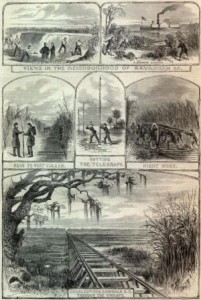 The pastor of the First Baptist Church of Georgia’s port city of Savannah reports on his church’s activities in a letter published in today’s edition of the local newspaper, the Savannah Republican.
The pastor of the First Baptist Church of Georgia’s port city of Savannah reports on his church’s activities in a letter published in today’s edition of the local newspaper, the Savannah Republican.
Mr. Editor:
A communication in your paper signed “A Soldier,” implies a want of information. “One of the Clergy,” in the paper of this morning, gives the appointments in the Episcopal Churches, and says “I have no doubt that there are weekly services at the Baptist and Methodist Churches, of which I am not informed.”
He is correct in his suppositions. In the Baptist Church there are, beside the regular Sabbath services, a prayer meeting on Tuesday afternoon, and a lecture on Thursday evening at 7 ¾ o’clock. At all our meetings soldiers are ever welcome.
Then, the Board of Baptist Missions have two missionaries here, whose whole time is devoted to the religious interests of the soldiers, Rev. D. G. Daniell, long and well known in Georgia as a pastor and agent, and recently a chaplain of the 29th Regiment, and Rev. A. D. Cohen, formerly a pastor at Newbern, N. C., but driven from his home by the enemy, and recently a chaplain in the Army of the Potomac. These ministers of experience, intelligence and unquestioned piety, devote their time to preaching in the camp and hospitals, and distributing tracts, hymn books and Testaments. They have circulated thousands and tens of thousands of pages of printed truth. The tracts are free from all sectarianism. They also circulate all the religious papers they can get of an evangelical character.
Then, the Rev. J. H. Campbell, for thirty years an efficient Baptist preacher, is acting as army evangelist, and sustained by voluntary contributions from the citizens of Georgia.—Surely then, this is something for the cause of religion in this day of trials. And yet this is but the work of one denomination represented in the city.
To the soldiers, the labors of these men and the religious reading are gratuitous. We wish we could do more; but we do not desire that it should be supposed by any that we are doing nothing.
For more than two years, during the whole war, all the religious denominations of the city, who were willing to unite, have met every week to pray for the country. This meeting is held on Wednesday afternoon. Never has there been one week of the war which has not been thus whitened in Savannah by this concert of special prayer. These meetings are conducted in rotation by the Presbyterian, Methodist, and Baptist pastors. The soldiers may rest assured that we shall not forsake our altars, nor cease to cry to God for blessings on them and our country.
God grant that our soldiers may be pervaded by the spirit of God! May they [illegible] the sin which is a reproach to any people, and seek that righteousness which exalteth a nation.
In the language of Dr. Palmer, we feel that as ministers of the Gospel, we can carry our country’s cause before God, and leave it under the shadow of his throne.
S. Landrum
Source: S. Landrum, “Information as to Christian Effort in Savannah,” Savannah Republican, March 10, 1863 (link)


